Summary of Findings
Democratic voters are not as positive about Barack Obama as they were a month ago. Somewhat smaller percentages of Democrats describe Obama in favorable terms, and he has lost his lead over Hillary Clinton in the race for the Democratic nomination. Nationally, Democratic voters are about evenly divided between Obama and Clinton; Obama holds a slight 47% to 45% edge. In late March, the Illinois senator held a 49% to 39% lead over his New York rival.

The tightening Democratic race reflects a modest but consistent decline in Obama’s personal image rather than improved impressions of Clinton. Fewer Democrats ascribe positive qualities to Obama than did so a month ago, with white working-class Democrats, in particular, expressing more skeptical views of the Illinois senator. Since late February, his unfavorable rating has risen six points among all Democratic and Democratic-leaning voters. At the same time, Clinton’s unfavorable rating among Democratic voters also has increased by seven points.
Compared with a month ago, race and class are now bigger drivers of preferences in the Democratic contest. Obama has lost ground among whites – especially white working-class voters – who now prefer Clinton by an even larger margin than they did in late March. Her lead among whites who did not attend college has increased from 10 points in March to 40 points today, and her lead among white Democrats who earn less than $50,000 a year has increased from two points to 24 points. Clinton has taken a 10-point lead among white male Democratic voters – erasing Obama’s advantage with the group – and she now runs better among Democrats under age 50 than she had previously.
Although Obama’s personal image has eroded modestly, it remains highly positive and surpasses Clinton’s on most dimensions. Large percentages of Democratic voters continue to see him as honest, inspiring, and down-to-earth; however, fewer associated each of these qualities with him – particularly down-to-earth – than did so a month ago. The proportion of Democratic voters who view Obama as down-to-earth has fallen nine points since March and the decline has been even larger among white Democrats with annual incomes of below $50,000 (15 points).
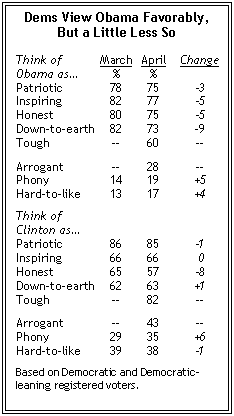
Beyond the small increase in negative opinion about Obama, fewer voters are now using highly complimentary terms to describe their impressions of him. Asked what one word best describes their impression of Obama, “inexperienced” is mentioned most frequently, as in February, but fewer mention Obama’s charisma and intelligence than did so two months ago.
The latest national survey by the Pew Research Center for the People & the Press was conducted April 23-27, before the appearance by Rev. Jeremiah Wright, Obama’s controversial former pastor, at the National Press Club. It finds that Clinton holds a substantial advantage over Obama with respect to two personal qualities – toughness and patriotism. Clinton holds her greatest image advantage in perceptions of toughness; 82% of Democratic voters view Clinton as tough, compared with 60% who say this trait applies to Obama. However, significantly more voters describe Clinton as arrogant than say that about Obama (43% vs. 28%).
And while she has made gains in overall support among Democrats, Clinton’s credibility problem is, if anything, greater than it was a month ago. The proportion of Democratic voters describing Clinton as honest fell from 65% to 57%, and the percentage describing her as phony increased from 29% to 35%.
The unresolved Obama-Clinton race is wearing thin on an increasing number of Democrats. About half of Democratic and Democratic-leaning independent voters (51%) say the fact that the race is not settled is a bad thing for the Democratic Party. In March, just 41% of Democrats expressed this view, and in February only 27% of Democrats said the protracted battle was bad for the party. In addition, the campaign has taken a toll on how both Obama and Clinton voters view the other candidate; since the beginning of the year, unfavorable opinions of both Obama and Clinton have increased substantially among the supporters of each candidate’s rival.
Nonetheless, there is no indication that either Obama or Clinton have been weakened in general election matchups against John McCain. As in March, both Democrats best McCain in general election matchups by small margins (Obama by 50% to 44%, and Clinton by 49% to 45%).
As was the case in previous surveys, the Democrats have different patterns of voter support in the general election tests. Clinton runs slightly better than Obama among core Democrats; 81% of Democratic voters favor Clinton over McCain, while 77% of Democrats support Obama over the presumptive GOP nominee. Obama runs a bit better than Clinton among independents; he wins 52% of the votes of independents, while she garners 44%.
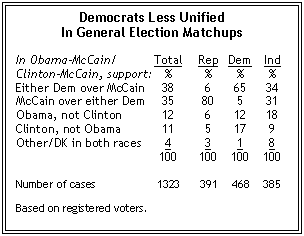
When the two possible November matchups are analyzed together, Democrats are more divided in their preferences. About two-thirds of core Democratic voters (65%) say they will back either of the Democratic candidates over John McCain, compared with 80% of Republicans who say they will back McCain regardless of the Democratic nominee. About three-in-ten Democrats (29%) say they will back only one of the Democrats this fall (17% Clinton only, 12% Obama only).
About a third of independent voters (34%) say they would support either Democratic candidate over McCain, while 31% say they would back McCain over either Obama or Clinton. Obama’s appeal among independents is evident in the combined November matchups; twice as many independents say they would support Obama but not Clinton in the fall as say the opposite (18% vs. 9%).
McCain Seen as More Centrist
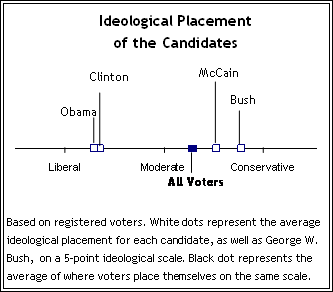
For his part, McCain runs better in the general election tests against both Democratic candidates among college graduates and white men. More generally, the current poll finds that McCain’s competitiveness against both Democrats is buttressed by the fact that voters continue to see him as a centrist whose views are fairly close to their own, and less conservative than George W. Bush’s. In contrast, voters place both Clinton and Obama considerably to the left of where they place themselves. These ideological perceptions of the candidates have changed little over the past three months.
While McCain is seen as more centrist than the Democratic candidates, he does not inspire as much confidence as either of them does to handle the issue voters would most like to see the candidates address: the economy. By wide margins, voters choose either Obama or Clinton as better able than McCain to improve economic conditions.
Yet voters have much more confidence in McCain than either Democrat to defend the country against future terrorist attacks. McCain’s advantage over Obama is particularly large. By 63% to 26%, more voters say McCain rather than Obama would do a better job of handling terrorism, which is a far greater margin than Bush ever enjoyed over John Kerry on this issue.
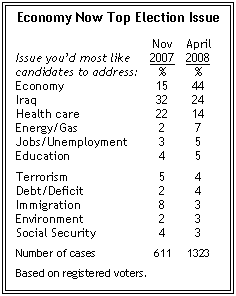
The economy is much more important in this election than terrorism – or any other issue – in the eyes of voters. Fully 44% name the economy as the single issue they would like to hear the candidates address, up from just 15% in November. About a quarter (24%) say they most want to hear about the war in Iraq, down from 32% in November. Just 4% of voters volunteer terrorism as the single issue they want the candidates to address.
The survey finds that voters are more closely divided than in March about whether Obama or McCain would prevail in a general election matchup. Currently, 47% say Obama would be more likely to win, while 42% choose McCain. In March, Obama was seen as the likely victor by a greater margin (50% to 38%). Voters are evenly split over who would win a Clinton-McCain election; 46% predict McCain would win while 45% say Clinton. Opinions about how this race might turn out have not changed much since March.
Election Enthusiasm Gap
The Weekly News Interest Index has shown a decline in public interest in the presidential campaign since early March. However, a large percentage of voters say they are giving a lot of thought to the election; 77% currently say they are giving a lot of thought to the election, virtually unchanged from last month (78%). This is comparable to the proportion of voters who typically say they are deeply engaged in the election at the end of the campaign.
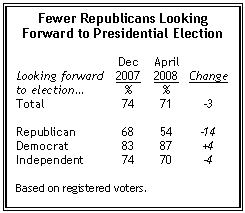
About equal numbers of Democratic and Republican voters say they have given a lot of thought to the election. But the poll also finds evidence of a partisan enthusiasm gap. Fully 87% of Democratic voters say they are looking forward to the fall election compared with just 54% of Republican voters. In December, before the start of the primaries, 68% of Republicans said they were looking forward to the general election.
Trade, Iraq Viewed More Negatively
With public views of the national economy continuing to be quite negative, Americans now are taking a much more critical view of free trade agreements. Nearly half of Americans (48%) say that the World Trade Organization and free trade agreements such as NAFTA have been bad for the country; 35% say such agreements have been good for the United States. This is the first time a plurality has expressed a negative view of the impact of free trade agreements since the question was first asked a decade ago.
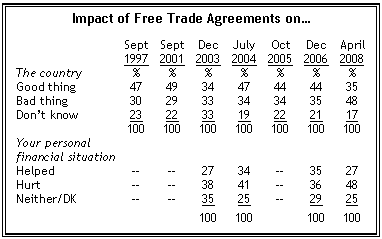
An increasing number of Americans also say that their personal financial situation has been hurt by free trade agreements. The proportion expressing this opinion has increased by 12 points since December 2006.
Most Americans now say that free trade agreements lead to job losses (61%) and make workers’ wages lower (56%); both percentages are up sharply from 2006. In addition, half of the public says that free trade agreements make the economy slow down, an increase of 16 points since 2006.
The survey also finds that the positive recent trend in public perceptions and attitudes about the war in Iraq has been reversed. A solid majority of Americans (56%) favors withdrawing U.S. forces from Iraq as soon as possible, rather than keeping them there until the situation is stable. In February, 49% favored a troop withdrawal. The share saying the United States will succeed in achieving its goals in Iraq, which reached its highest level in more than a year in February (53%), has declined to 47% in the current survey.




